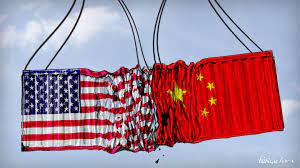Export Control Reform Focuses on Chinese Trade and Security Issues (Part II of II)

Alex Cotoia, Regulatory Manager and Compliance Consultant at The Volkov Law Group, rejoins us for the second part of his blog posting on Chinese trade and security issues. Alex can be reached at [email protected].
On November 17, 2021, a bipartisan congressional commission—the U.S.-China Economic and Security Review Commission—released a series of recommendations that called upon the Congress itself to assume a more proactive role in the implementation and oversight of export control reform (“ECR”).
Specifically, the Commission recommended that Congress create within the Executive Office of the President a Technology Transfer Review Group (“TTRG”) that would be responsible for identifying the most sensitive emerging and foundational technologies. Chaired by the Secretary of Defense, the TTRG would include the director of the Office of Science and Technology and cabinet-level secretaries (or their designees) from the Departments of Commerce, Energy and Homeland Security. Crucially, under the Commission’s recommendations, the TTRG would have principal responsibility for directing BIS “to implement export controls following the identification of [emerging and foundational] technologies.” In addition, the TTRG would have principal oversight of multilateral engagements related to export controls, foreign investment screening, and the implementation of regulations by relevant agencies to ensure that U.S. national and economic security interests are not undermined by such activities.

Of particular note is the Commission’s recommendation with respect to end-user verification of U.S. exports. In a tersely worded recommendation that implicitly criticized responsible agencies for their lack of vigilance in this area, the Commission recommended the allocation of additional resources to expand end-user verification of export controls. The Commission further recommended “strict scrutiny” of entities identified as (1) Chinese Communist Military Companies; (2) contributors to China’s military-civilian fusion activities; (3) having “direct and formal ties” to the Communist Party of China (“CPC”) or Chinese government; and (4) identified by the U.S. Trade Representative and Department of Justice as being linked to concerted efforts to steal or coerce the transfer of U.S intellectual property. Finally, the Commission recommended that the Congress require TTRG to engage with the Departments of Justice and Commerce to align deemed export controls with engagement on knowledge transfer and export recruitment strategies and other programs of the CCP designed to acquire U.S. technology and capabilities. Although the Commission’s final recommendation lacks additional context, the deemed export rule—codified at 15 C.F.R. 734.13(b)— is often utilized by organizations conducting scientific and technological research such as colleges and universities and high-tech organizations with strong research and development components. More vigorous enforcement of the deemed export rule would likely make it harder for such institutions to share the most sensitive research with Chinese foreign nationals tied to organizations reputed to have links to the CPC or Chinese government.
The Bottom Line for Industry

Increased focus on export controls as the key to safeguarding U.S-origin technology from Chinese acquisition and diversion is a clearly a high priority for both the Congress and the current Administration. Those engaged in the export of sensitive technologies to companies in China should continue to monitor BIS’s actions with respect to more frequent additions to the Entity List and a renewed focus on the importance of the Unverified List in making license determinations.
Congressional action should also be monitored to determine whether the U.S.-China Economic and Security Review Commission recommendations, if any, are officially adopted by Congress via formal legislation. As U.S.-China relations continue to deteriorate, it is imperative that all organizations conducting business in China stay attuned to the latest developments and appropriately adjust their risk assessments to reflect this new geopolitical reality.
















1 Response
[…] Source link […]